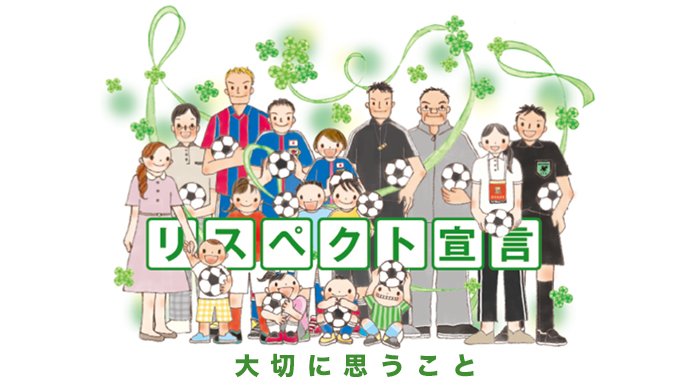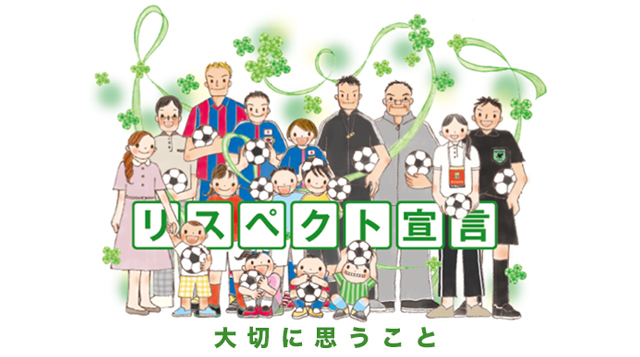Respect


We, Japan Football Association and J-League are strongly aware of the social role played by football and sports, and recognizing the importance of respect in football, since 2008 we are leading "the Respect Project".
We think that the essence of respect is to play doing always the best and we catch it as the basis of fair play. We decided to consider it in relationship with team mates, opponents, referees, coaches, goods, facilities, parents, tournament officials, supporters, competition rules, the spirit of football and all the things surrounding football, and to "treasure" it.
"Aim for a fair and strong Japan team". Respect is a value of which Japan is pride of and it is a value recognized all over the world. It is important to play in Japanese style. That will lead to the increase of the value of football and sports. That is what is exactly needed in contemporary society. Football will be respected by society and it will become culture. We would like to spread these values from football to sport and to Japanese society.
Related information
What is Fair play?
- 1
Understand correctly and observe the rules
The basis of fair play is to understand correctly the rules and to try to observe them - 2
The rules' spirits: safety, impartiality, delight
Rules are established with the intention to allow everyone to play safely without injuries, to be impartial to both teams and players, to allow everyone to enjoy playing. - 3
Respect the referees
The referee is the person who was asked to take care that both teams respect the rules and that the game is fair. Because he is a human being, he may make some mistakes, but having decided to leave him the final decision, we must trust him and respect his decisions. - 4
Respect the opponents
The opponent team's players are not "enemies". They are precious "friends" that we enjoy football with. We should absolutely not play in a way that may hurt these friends.
JFA Code of conduct in football
- 1
Best effort
In any situation , it is necessary to put forth one's best efforts until the very end in order to get a victory, to get one goal. - 2
Fair play
It is necessary to understand the spirit of fair play and to act in a fair way. - 3
Observation of the rules
It is necessary to observe the rules and act according to the spirit of the rules. - 4
Respect the opponent
It is necessary to relate to opponent team's players and referees with respect and friendship. - 5
Acceptance of the outcome
Do not forget modesty in victory and accept defeat proudly. - 6
Get new friends
It is important to make efforts to get new friends to play football with. - 7
Improvement of the environment
It is important to make efforts to improve the football environment - 8
Act with responsibility
As member of the society. it is necessary to act with responsibility. - 9
Sound economic sense
In any situation, t is necessary to act on the basis of a sound economic sense. - 10
Fight against social evils
It is necessary to fight resolutely against social evils like drug abuse and discrimination. - 11
Gratitude and joy
It is important to take part in football in gratitude and joy.
Green Card System
JFA is encouraging the active use of the green card in the matches of the (four) categories of children under 12.
Football is a school of life. This fantastic game is not only something enjoyable, but is also something that evokes feelings.
Unhappiness and tears when losing the match, joy and celebration when winning. Football is a teacher. Football gives children the opportunity to learn life's virtues and values.
- Work together as one team
- Help each other on the field
- Always exhibit fair play
- Exhibit good sportsmanship
- Help injured players and show sympathy to these players
- Praise both the winner and the loser
- Respect opponents, team officials and referees
These values can be applied in everyday life in relationship with the family and the community. Football helps the players to grow physically, socially and psychologically.
Games Everyday, all over the world, myriads of matches are played. Most of them are played for fun. The referee is the person who takes care of the observation of the rules. The referee ensures that the rules are observed and that everyone can enjoy the game. Yellow cards and Red Cards Actually, the referee's duty is to notify the player to what extent his acts are violating the rules, by using the yellow cards and the red cards. These cards are used in order to explain to certain players that their negative behaviours are not fair and to what extent those are not allowed.
The referee shows these cards and tries to be fair with all the 22 players on the field.
Positive education When children are starting playing football, we have to teach them not only the techniques, but also "what they must not do". Sometimes, during trainings and matches, the attention is concentrated on the things that must not be done, but it is necessary to praise and thank children for their good behaviours. This is the concept that lies behind the green card.
The green card has the following meanings :
- That is a good behaviour. Keep behaving in this way.
- Reconfirm and strengthen a positive behaviour.
- That is a positive education.
- Recognize, express gratitude and encourage to do more.
- You are an example for others.
- Supporters and officials are recognizing and praising your behaviour.
Green cards are shown in occasion of following behaviours.
- Compassion for injured players.
- Apologies and handshakes in case of not intended fouls.
- Self-assessment (when the ball crosses the lines: throw-ins, corner kicks, goal-kicks, goals)
- Prevent team mates from behaving problematically.
- Behave positively, without receiving warnings nor being expelled.
( The referee will show the card to the team's bench when blowing the final whistle)
JFA is promoting fair play through the active use of the green card.






